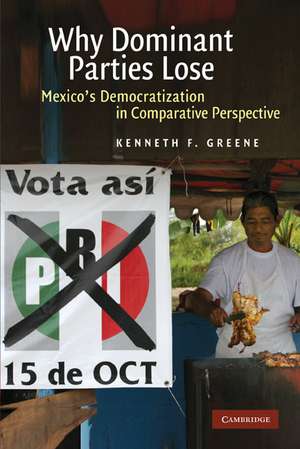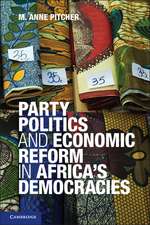Why Dominant Parties Lose: Mexico's Democratization in Comparative Perspective
Autor Kenneth F. Greeneen Limba Engleză Paperback – 30 iul 2009
| Toate formatele și edițiile | Preț | Express |
|---|---|---|
| Paperback (1) | 285.41 lei 43-57 zile | |
| Cambridge University Press – 30 iul 2009 | 285.41 lei 43-57 zile | |
| Hardback (1) | 531.04 lei 43-57 zile | |
| Cambridge University Press – 2 sep 2007 | 531.04 lei 43-57 zile |
Preț: 285.41 lei
Nou
Puncte Express: 428
Preț estimativ în valută:
54.63€ • 59.36$ • 45.92£
54.63€ • 59.36$ • 45.92£
Carte tipărită la comandă
Livrare economică 21 aprilie-05 mai
Preluare comenzi: 021 569.72.76
Specificații
ISBN-13: 9780521139892
ISBN-10: 0521139899
Pagini: 368
Ilustrații: 1
Dimensiuni: 152 x 226 x 28 mm
Greutate: 0.54 kg
Editura: Cambridge University Press
Colecția Cambridge University Press
Locul publicării:New York, United States
ISBN-10: 0521139899
Pagini: 368
Ilustrații: 1
Dimensiuni: 152 x 226 x 28 mm
Greutate: 0.54 kg
Editura: Cambridge University Press
Colecția Cambridge University Press
Locul publicării:New York, United States
Cuprins
Part I. The Macro Perspective: 1. A theory of single-party dominance and opposition party development; 2. Dominant party advantages and opposition party failure, 1930s–90s; Part II. The Micro Perspective: 3. Why participate? A theory of elite activism in dominant party systems; 4. The empirical dynamics of elite activism; Part III. Implications: 5. Constrained to the core: opposition party organizations, 1980s–90s; 6. Dominance defeated: voting behavior in the 2000 elections; 7. Extending the argument: Italy, Japan, Malaysia, and Taiwan.
Recenzii
"In this scholarly tour de force, Greene combines original formal models and other careful methods in developing a novel and persuasive argument for the longevity and decline of dominant parties. This book contributes significantly to our understanding of Mexican politics, the comparative study of competitive authoritarian regimes, and party formation."
-Jorge I. Domínguez, Harvard University
"Kenneth Greene’s book contributes major insights to the comparative study of dominant party regimes, whether in an authoritarian or a democratic regime context, by showing why political activists cannot easily form a credible challenger to the incumbent party and linking this to political economic institutions and performance."
-Herbert Kitschelt, Duke University
"Kenneth Greene has produced an excellent and important contribution to the literature on the persistence and decline of dominant party systems in general, and on the Mexican case in particular. His resource theory of single-party dominance is married to an innovative model of the political behavior of party elites to show how the incumbent’s patronage advantages make opposition parties undercompetitive. This well-argued and evidenced study will be of interest not only to Latin Americanists, but also to scholars of party system development more broadly."
-Marcus J. Kurtz, Ohio State University
"Why Dominant Parties Lose asks great questions about how some political parties become dominant and why they cease being dominant after an extended period of time. Greene answers these questions in a creative and skillful manner, with theoretical insight and empirical rigor. Based on many years of careful research, the book fruitfully illuminates the Mexican case and effectively places it in a broader theoretical framework."
-Scott Mainwaring, Kellogg Institute for International Studies
"Kenneth F. Greene [...]make['s] important, original contributions to this debate and to the broader analysis of political parties, elections and democratization. [...]Greene provides an important insight into the internal dynamics of opposition parties and the challenges they confront in dominant-party systems."
-Kevin J. Middlebrook, University of London, Perspectives on Politics
“…this is a scholarly tour de force in its formal models, applied statistical work, qualitative case studies, and vision of party formation and regime transition.”
Jorge I. Domínguez, Harvard University, Political Science Quarterly
“In this fascinating study, Kenneth F. Greene identifies the factors that perpetuated ‘dominant party authoritarian regimes’ (DPARs) in Mexico and other nations, such as Taiwan and Malaysia, despite the existence of competitive electoral systems…Greene has forged a unified and compelling theory that explains much of Mexican political history from 1929 to the present. Why Dominant Parties Lose will undoubtedly set the parameters for future debates on the nature of the Mexican political system and inform broader comparative discussions on party system formation.”
Adrian A. Bantjes, University of Wyoming, Laramie, Comparative Political Studies
“Greene offers an important, well-written book that attempts to explain why dominant political parties are able to sustain their predominance and why those same parties eventually lose power…While focusing on Mexico’s party system, he nevertheless addresses other dominant party systems, giving the analysis greater generalizability and broader appeal. This book opens a window into a neglected area in the democratization literature--dominant party authoritarian regimes. The book also makes a strong contribution to the general literature on political parties. Summing Up: Highly recommended.”
P. M. Sanchez, Loyola University Chicago, Choice
“Why Dominant Parties Lose is a well crafted book that contributes significantly to the literature on Mexican politics, party systems, political transition and comparative political regimes… He develops a sophisticated theory of single-party dominance and opposition party development that features formal modeling, quantitative analysis, and qualitative fieldwork… In sum, this is a great book, featuring an extensive review of the vast literature in the field, great mastery of the theoretical and methodological tools available in the discipline, a carefully argued case for the author’s significant contribution, all of which delivered in self-possessed and dispassionate prose.”
Yvon Grenier, St. Francis Xavier University, Canadian Journal of Political Science
-Jorge I. Domínguez, Harvard University
"Kenneth Greene’s book contributes major insights to the comparative study of dominant party regimes, whether in an authoritarian or a democratic regime context, by showing why political activists cannot easily form a credible challenger to the incumbent party and linking this to political economic institutions and performance."
-Herbert Kitschelt, Duke University
"Kenneth Greene has produced an excellent and important contribution to the literature on the persistence and decline of dominant party systems in general, and on the Mexican case in particular. His resource theory of single-party dominance is married to an innovative model of the political behavior of party elites to show how the incumbent’s patronage advantages make opposition parties undercompetitive. This well-argued and evidenced study will be of interest not only to Latin Americanists, but also to scholars of party system development more broadly."
-Marcus J. Kurtz, Ohio State University
"Why Dominant Parties Lose asks great questions about how some political parties become dominant and why they cease being dominant after an extended period of time. Greene answers these questions in a creative and skillful manner, with theoretical insight and empirical rigor. Based on many years of careful research, the book fruitfully illuminates the Mexican case and effectively places it in a broader theoretical framework."
-Scott Mainwaring, Kellogg Institute for International Studies
"Kenneth F. Greene [...]make['s] important, original contributions to this debate and to the broader analysis of political parties, elections and democratization. [...]Greene provides an important insight into the internal dynamics of opposition parties and the challenges they confront in dominant-party systems."
-Kevin J. Middlebrook, University of London, Perspectives on Politics
“…this is a scholarly tour de force in its formal models, applied statistical work, qualitative case studies, and vision of party formation and regime transition.”
Jorge I. Domínguez, Harvard University, Political Science Quarterly
“In this fascinating study, Kenneth F. Greene identifies the factors that perpetuated ‘dominant party authoritarian regimes’ (DPARs) in Mexico and other nations, such as Taiwan and Malaysia, despite the existence of competitive electoral systems…Greene has forged a unified and compelling theory that explains much of Mexican political history from 1929 to the present. Why Dominant Parties Lose will undoubtedly set the parameters for future debates on the nature of the Mexican political system and inform broader comparative discussions on party system formation.”
Adrian A. Bantjes, University of Wyoming, Laramie, Comparative Political Studies
“Greene offers an important, well-written book that attempts to explain why dominant political parties are able to sustain their predominance and why those same parties eventually lose power…While focusing on Mexico’s party system, he nevertheless addresses other dominant party systems, giving the analysis greater generalizability and broader appeal. This book opens a window into a neglected area in the democratization literature--dominant party authoritarian regimes. The book also makes a strong contribution to the general literature on political parties. Summing Up: Highly recommended.”
P. M. Sanchez, Loyola University Chicago, Choice
“Why Dominant Parties Lose is a well crafted book that contributes significantly to the literature on Mexican politics, party systems, political transition and comparative political regimes… He develops a sophisticated theory of single-party dominance and opposition party development that features formal modeling, quantitative analysis, and qualitative fieldwork… In sum, this is a great book, featuring an extensive review of the vast literature in the field, great mastery of the theoretical and methodological tools available in the discipline, a carefully argued case for the author’s significant contribution, all of which delivered in self-possessed and dispassionate prose.”
Yvon Grenier, St. Francis Xavier University, Canadian Journal of Political Science
Descriere
Why Dominant Parties Lose develops a theory of single-party dominance, its durability, and its breakdown into a fully competitive democracy.
















